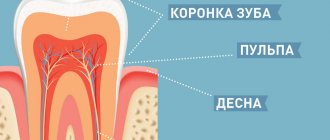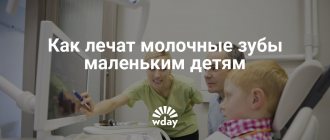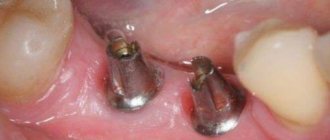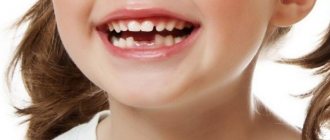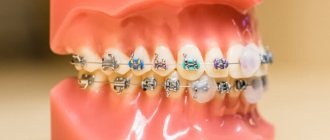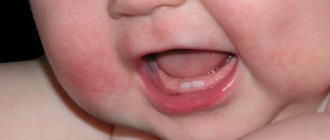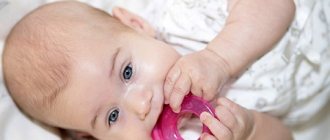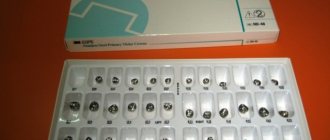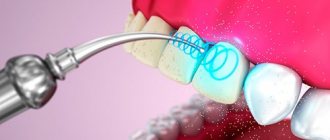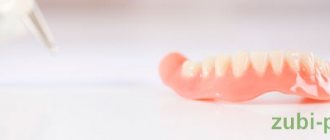There are many misconceptions about whether children's baby teeth hurt. Some parents believe that there is no need to treat these teeth, because they change with age. Others, on the contrary, are convinced that baby teeth require exactly the same amount of care and attention as permanent teeth. Which one is right?
Do baby teeth hurt in children?
First, it’s worth understanding how the dental system develops in children. By the time the baby is born, his mouth is completely missing teeth, which is beneficial for the baby, because his food for the next few months will be breast milk. In addition to the absence of teeth, infants differ from older children in that they have a pronounced sucking reflex. They also have a special type of breathing and a small size of the lower jaw relative to the upper. All these features help infants when feeding on mother's milk.
Infants have no teeth
Why can a child have a toothache?
For treatment to be effective, it is important to promptly determine the factors that provoked the disease. Obviously, caries is the most common cause of painful sensations.
They can occur before the first signs of enamel destruction appear, from pressure on the tooth when chewing, eating sweets, cold or hot food. The worsening of the disease is indicated by a hole that appears in the tooth cavity, often black.
If you do not seek medical help in time, caries can provoke pulpitis and periostitis - inflammation of the pulp and periosteum. The pain associated with these diseases is unbearable.
In addition to caries, there are many other reasons why baby teeth hurt.
The main ones:
- Eruption and replacement of the first teeth with permanent ones. The process is accompanied by unpleasant sensations, swelling of the gums, and a possible increase in temperature, especially if fangs begin to appear.
- Abscess. Caused by the accumulation of purulent fluid in the gum tissue.
- Herpes stomatitis. Occurs in preschoolers and adolescents.
- Gingivitis. Inflammation of the gums adjacent to the tooth tissue.
- Neuralgia. Painful processes in the ear or head are localized in the jaw, which gives the child the feeling that a tooth hurts.
- Damage caused by trauma. The pain can be caused by a small object or piece of food stuck between the teeth.
It happens that pain in the jaw area appears after medical intervention if:
- An incorrectly selected filling material was used.
- A diagnostic error has occurred.
- The treatment has not been completed.
- During the treatment, soft tissues were injured.
- The cavity treatment and filling were performed in violation of the technology.
Important! It is recommended to pull out a child’s tooth as a last resort, since its absence leads to disruption of the formation of the bite.
Prevention measures
As soon as the child has his first teeth, you need to take care of their hygiene.
Is it possible to avoid dental problems? We suggest that you familiarize yourself with the following preventive measures:
- Limit the amount of sweets (especially caramels and Chupa Chups). If your child has eaten sweets, take the time to pour a glass of warm water so that he can rinse his mouth.
- You shouldn't buy crumbs of chewing gum. They violate the integrity of the enamel.
- Visit your dentist every six months.
- Choose a brush and toothpaste that is appropriate for the child's age.
Many parents do not visit the dentist with their children until their permanent teeth appear. This is a big mistake. If an infection appears in the oral cavity, it will spread to other teeth.
Believe me, there is nothing wrong with visiting a pediatric dentist. In most clinics, offices are equipped with televisions that show cartoons, comfortable chairs, and silent drills. Explain to the baby that the specialist will not hurt him and, perhaps, the dentist will become his favorite doctor .
Inspection
Children often cannot determine where exactly it hurts. If the baby complains, to provide help you must first examine the mouth and find the source of the trouble. It is convenient to use a small flashlight for this purpose. Further procedure:
- If dental problems are detected, it is necessary to contact a specialist as soon as possible, until then you can relieve the pain on your own.
- If you find an object stuck in the gum or between the teeth, you should try to carefully pull it out with sterilized tweezers. If it is difficult to remove the foreign body, it is better to take the baby to the emergency room.
- In case of injury: tooth dislocation, loss or fracture, only a dentist can help.
The entire knocked out tooth can be saved. To do this, it is recommended to place it in a container with saline solution or warm milk and seek help from a doctor within half an hour. - If a baby suffers from the eruption of fangs and incisors, special gels with an analgesic effect will help: “Kamistad”, “Kalgel”, “Dentinox”.
Advice. Sometimes simply brushing your teeth can bring relief if hard food particles are causing pain.
What to do?
If a child is suffering from excruciating toothache, it is recommended that he or she be taken to the dentist immediately. Only an experienced doctor, after a mandatory examination, will be able to determine the true cause of toothache and eliminate it.
Doctors often recommend removing diseased baby teeth, since filling them is extremely difficult. Even the removal of a temporary tooth in the dental office will be comfortable and calm for the baby.
- daily brushing of teeth;
- proper selection of toothpaste and brush;
- refusal to chew hard objects;
- regular visits to the dentist.
To prevent the recurrence of dental lesions, parents are advised to pay closer attention to what the baby eats and how he cares for the oral cavity.
First aid at home
The most dangerous situation is periostitis, or gumboil. If the temperature begins to rise and the cheek begins to swell, the pain is acute, you should contact a specialist without delay. The risk of pus penetrating into the tissues of the facial space is too high.
In other cases, when deciding what to do if a child has a toothache, you can choose the following methods:
- Apply traditional medicine recipes.
- Give your baby painkillers, adjusting the dosage based on age.
- Massage the upper part of the ear curl or the point at the junction of the index and thumb. Stimulating the cavity between the upper and lower jaw also helps.
Precautionary measures
A preventive visit to the dentist can prevent severe toothaches.
- From early childhood, teach your child the rules of personal hygiene, in particular caring for teeth, the need to brush them regularly, use a toothbrush, squeeze out toothpaste correctly, and use mouthwash.
- Teach your baby to rinse his mouth after every meal.
- It is important that the toddler’s diet does not include a large amount of sugary drinks and food. You need to understand that sugar can provoke various diseases, in particular those that affect the dental cavity. Sweets are an excellent breeding ground for pathogenic microorganisms.
- It is important to pay great attention to what the child eats. His diet must contain all the necessary microelements and vitamins, as well as biologically active substances.
- Do not delay visiting the dentist until severe pain occurs. It is better if you bring your little one to the dental office from time to time, for example, once every 4-6 months. This way you will be able to prevent a neglected condition in a timely manner. In addition, this will help the baby get used to the dentist, therefore, in the future you will be able to avoid fear and tears due to visiting the doctor. A 6-year-old child should already respond calmly to a visit to the dentist’s office.
When my son had a toothache, the first thing we did was rinse his mouth. If this did not help, I gave him an ibuprofen-based analgesic, after which he immediately made an appointment with the dentist. Our cases of toothache were isolated, since we visit the dentist every six months, preventing the development of deep problems.
Parents should know what to do if their child starts to have a toothache. Remember that toothache is one of the most severe pains and will not go away on its own. You can only temporarily alleviate the child’s condition, but you will still have to see a doctor. From childhood, teach your child to take care of the oral cavity and visit the dentist's office.
Drug treatment
Modern children's painkillers are low-toxic, act quickly (within 20–30 minutes) and rarely cause allergies. The most popular substances used in pharmaceuticals include:
- «Ibuprofen"(included in suspensions called "Ibufen", "Nurofen"). Allowed for children over six months of age. Not only relieves pain, but also relieves inflammation, has a long-term effect: 6–8 hours.
The kit includes a special plastic syringe with a dosimeter. - «Nimesulide"("Nise", "Nimesil"). It lasts up to 12 hours and has a strong antipyretic effect, therefore, according to the recommendation of Dr. Komarovsky, the drug should be dosed strictly according to the instructions or a slightly smaller amount should be used. Allowed from 12 years of age.
- Paracetamol (“Cefekon”, “Tylol”, “Efferalgan”, “Panadol”). Used for children over 3 months in syrup form, lasts about 6 hours.
Products for topical use:
- «Cholisal gel" Designed for babies from one year old. Anesthetizes, reduces swelling and inflammation, has an antimicrobial effect.
- «Kalgel», «Kamistad", lidocaine gels are not suitable for frequent use.
- Dental drops for children. For young patients they are diluted with water; after 12 years of age, treatment is carried out according to the instructions.
Important! Before numbing a child’s tooth, look at the composition of the product. Alcohol-containing drops and tinctures are not suitable for a child. It is better to choose another medication.
Dangerous symptoms
If a child has a baby toothache, parents need to first of all pay attention to the following manifestations:
- the presence of yellowish, white, brown spots on the enamel (an early sign of caries);
- small or larger holes in the teeth (cavities);
- increased sensitivity of the enamel (the baby experiences discomfort when eating excessively hot or cold food);
- there is an unpleasant odor from the mouth (pathogenic microorganisms - the “culprits” of caries and inflammatory processes - cause the process of rotting of food debris between the teeth).
Pediatric dentists coin the concept of “bottle caries.” This disease affects infants and occurs due to the fact that parents give them bottles of sweet liquid (compote, juice, sweetened milk) before bedtime. The sucrose contained in such drinks “acidifies” the oral mucosa, creating favorable conditions for the reproduction and “attacks” of pathogenic microorganisms.
What is the danger of caries: the disease develops rapidly, but is asymptomatic. Carious lesions gradually deepen, becoming “gateways” for infection, and the risk of complications (acute and chronic inflammatory processes in the oral cavity) increases. That is why, at the first symptoms of a problem, it is recommended to seek help from a dentist (otherwise, the affected baby tooth will have to be pulled out).
Other warning signs that parents should definitely pay attention to:
- rash, itching on the skin of the face, neck (signs of an allergy to filling material);
- swelling, swelling, redness of the gums (a symptom of gingivitis);
- increased body temperature (accompanies any inflammatory process);
- ulcers, yellowish-white plaque on the oral mucosa (gingivitis, stomatitis);
- loose baby tooth (a physiologically normal phenomenon, which nevertheless leads to soft tissue injuries and, accordingly, causes pain and discomfort).
Regardless of whether a child’s baby teeth damaged by caries hurt or not, they need to be treated. At the initial stages, the silvering method is sufficient - silver nitrates are applied to the enamel.
This procedure is painless, allows you to quickly stop the destruction of bone tissue, but leads to blackening of the treated unit - this causes aesthetic inconvenience. What to do in case of childhood caries in addition to silvering: pay attention to the remineralization method.
The lesions affected by caries are first sanded off, then fluoride varnish is applied to the tooth. Such manipulations protect the tooth from further destruction, and the child is not in any pain during the procedure. To treat caries at the stage of spots on the enamel, the pediatric dentist can use Icon. It is applied in a dense layer to the “problem” teeth, polymerized using a UV lamp - the carious process is stopped.
At later stages of caries development, the hole in the baby tooth is closed with a filling. The composite contains substances that strengthen bone tissue. Treatment of childhood pulpitis can be conservative - the carious cavity is opened, thoroughly washed, disinfected, and closed with a filling. In addition, if indicated, you can fight the disease:
- electrophoresis (medicines that have a therapeutic effect on the tooth are injected into the affected area);
- surgical method (the pulp is partially or completely removed).
Read also: How to pull out a tooth
So, in the latter case, a pediatric dentist can offer vital (only the coronal pulp is removed) or devital (the nerve is killed with arsenic preparations, the non-living pulp is excised, a medicinal paste is placed in the cleaned lesion, which does not allow the infection to spread further) amputation. Treatment of pulpitis in children involves the use of modern safe hypoallergenic local anesthesia.
If indicated, the dentist can perform manipulations under general anesthesia (the child is restless, has a low pain threshold, etc.). Periostitis should be dealt with exclusively by surgery. The abscess is opened, washed, drainage is installed, and the cavity is treated with anti-inflammatory, antibacterial, and antiseptic compounds. After surgery, the child is usually prescribed a course of physical therapy.
Any diseases of the oral cavity of an inflammatory nature are treated comprehensively using local and systemic anti-inflammatory, antibacterial, analgesic, sedative and other compounds. If you are allergic to the composite, the filling is replaced with a new one; poor-quality filling is an indication for a repeat procedure.
Homeopathic remedies
Despite the fact that representatives of the Russian Academy of Sciences recognize homeopathy as pseudoscience, many parents testify to the effectiveness of the drugs. In case of unwanted use of medications, the following will help relieve discomfort:
- Dentokind tablets . They should be dissolved in the mouth until the grains completely disappear.
- Drops " Dantinorm baby ". They are used not only for dental problems, but also to relieve pain in diseases of the nasopharynx.
- Viburkol candles . Suppositories whose active ingredients are plant components.
- " Traumel-S ". The drug is plant-based, available in the form of drops, ointments and tablets. Can be used from three years of age. Contains extracts of arnica, echinacea, chamomile, and other medicinal herbs, as well as mercury in negligible quantities.
Important! Adult products should not be used to treat children.
It is risky to put a painkiller tablet - analgin, "Ketanov" - on a sore tooth. Firstly, it will accelerate the destruction of enamel, and secondly, it will put excessive stress on the organs.
Myths and reality
The roots of milkweeds are widely spaced, therefore they cover the germ of permanent teeth. Whatever happens to the baby tooth, it will affect the strength and stability of the permanent ones. Any dental problems must be addressed immediately.
A small hole in a baby tooth is already a cause for concern. The risk of rapid transition to pulpitis is high. This is followed by periodontitis, inflammation of the tissues that are located near the tooth. In this case, the permanent tooth germ may die.
There is an opinion that baby teeth cannot hurt due to the absence of nerves in them. Milk jugs are no different in structure from permanent ones. Their formation begins at the stage of pregnancy.
Baby teeth also hurt.
The process of mineralization of baby teeth determines their further condition after the birth of a child. Therefore, doctors strongly recommend that pregnant women pay attention to their diet, avoid stressful situations, do not take alcohol or drugs, stop smoking and spend more time in the fresh air.
Folk remedies
- If the pain is caused by pulpitis or caries, it is advisable to rinse your mouth as often as possible. Solutions of soda and salt, decoctions of medicinal herbs: chamomile, sage, calendula are suitable.
- Essential oils of clove or mint will ease the condition. The following method is recommended: apply the product to a cotton swab and place it on the desired location for a few minutes.
- Propolis – helps well with aching pain. By rolling a ball and placing it in the tooth cavity, you can relieve pain and reduce the risk of infection.
- Salo. Apply unsalted lard to the gum on the side of the cheek at the location of the pain.
- Garlic compress. Wrap crushed garlic in gauze and place it on your wrist in the place where the pulse is felt. If the tooth hurts on the right, the compress is applied to the left hand and vice versa.
- Fresh valerian leaves are applied on the side of inflammation.
- In some cases, applying a slice of cucumber or fresh potato to the sore spot helps relieve discomfort.
Important! If the traditional method helps or pain relief has a positive effect, you still need to see a doctor, even if the child is temporarily not worried.
Useful tips
What to do to prevent the pain from getting worse:
- Create a favorable emotional background at home. Give the child more time, play with him and distract him, calm him down if he is capricious, understand his condition.
- A sick baby should not take cold, hot or solid food. Spicy seasonings are excluded.
- If your gums hurt after removing a premolar, it is not recommended to eat for the first time. Among the liquids that can be drunk two hours after the procedure, milk, unsweetened tea and compote are recommended. It is advisable to drink drinks through a straw.
- If a baby's tooth begins to cut, you can give him a special cooled device.
- Rinse your mouth after eating, brush your teeth with a soft-bristled brush.
How does caries manifest in newborns?
Caries can develop in newborns. Here we are talking about bottle caries. Its name speaks for itself - it appears at the age of 0 to 4 months. Breastfeeding does not directly affect the development of pathology.
It is important to start treatment in a timely manner so as not to lead the tooth to pulpitis.
Night feedings with milk from a bottle or juices become a determining factor. The situation is aggravated by the infant's consumption of sweets and ignoring hygiene measures after feeding the child. When left untreated, bottle caries causes severe pain.
What not to do
Some actions by parents can harm the baby and aggravate the situation. It is incorrect to act as follows:
- Rinse your mouth with hot liquid.
- Get rid of a bad tooth at home, even if it starts to become loose. Removal must be carried out by a specialist.
- Apply hot compresses, especially if there is swelling in the cheek and jaw area.
- Try to open the tumor on the gum.
- Remove particles stuck between teeth with sharp or non-sterile objects.
- Give your baby antibiotics, analgesics and other drugs for adults on your own. By the way, aspirin is prohibited for children under 15 years of age in Russia and abroad.
Advice. Choosing a good pediatric dentist and clinic is important. Painlessly treating and removing teeth from children is a real art, and not every practicing doctor masters it. It is better to take care of finding a specialist in advance so that you know where to turn in case of trouble.
Baby tooth hurts after treatment
Pain in a baby tooth after treatment is also not uncommon. And here parents should carefully monitor the baby to understand the cause of the complaints:
- Poor quality treatment. The doctor did not clean the root canals well and did not place a sealed filling. There is only one solution - make an urgent appointment with the dentist and repeat treatment with a good dentist.
- Residual discomfort. This happens when the treatment is complex and soft tissues are injured during drilling or dental procedures. Adults should think about how to relieve a child’s toothache at home - give a painkiller or rinse. If you have long-term complaints, you should make an appointment with a doctor for a consultation and re-examination.
- Allergic reaction to materials and drugs. Allergies most often manifest themselves as itching, but can also cause pain. If the cause of the reaction is an anesthetic used by dentists, it is worth giving a suitable antihistamine. In other cases, you cannot do without visiting a doctor.
Marina Dolotova
You can find cheap dental clinics in Moscow, but it is always worth assessing the health risks. Children with poorly placed fillings are increasingly being brought to Azabuka. And, what’s worse, with prolonged inflammatory processes. Kids cry and complain. I treat teeth and reassure both patients and parents. Such practices are very sad.
